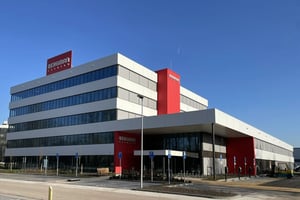Workers are faced with an unprecedented rise in digital technologies. How will this affect the skills they need now and – especially – in the future? A growing number of organisations are becoming aware that keeping people employable in the long term in a rapidly changing world requires more than the odd training course or two. They are investing in high-tech learning environments, with an emphasis on acquiring twenty-first century skills.
On the first floor of the office tower of a company called SkillsTown, the largest online training provider for professionals in the Netherlands, CEO Hans Schuurmans opens the door to a dark room. Once inside, the visitor is treated to the sight of a painstakingly replicated post-war office, complete with typewriter, cabinets filled with folders and an encyclopaedia, and an old-fashioned safe which can only be opened by punching in the correct code. The safe contains the key needed to exit the ‘escape room’, so to speak, which happens to lead into a second, highly futuristic office space. Here, too, the door to the hallway remains locked until the visitor has completed his assignment by managing to find the right combination of information.
“This escape room is one of the tools we use to show organisations the difference between ‘old’ and ‘new’ skills, what these skills involve exactly, and how they are applied in a practical setting,” Schuurmans says. “You can only leave the first room if you have the presence of mind to use the encyclopaedia as a source of information, since you need to hand in your phone before entering (hence, no Google). In the second room, you’re only able to gather the information you need if – among other tasks – you ask the right question to a voice-controlled smart speaker.”
Schuurmans is one of the authors of the Dutch-language book 21st century skills – dé uitdaging voor iedere medewerker en iedere organisatie (‘21st-Century Skills: The Ultimate Challenge for all Workers and Organisations’). He defines these skills as ‘those skills experts believe to be vital to performance in the twenty-first century workplace.’ As we learn, he is referring to ‘new’ competencies such as collaboration and communication, proactive behaviour, independent problem-solving and critical evaluation, self-direction and what is known as ‘digital literacy’: in other words, the ability to effectively and efficiently use technology such as computers, tablets and smartphones.
Although the concept of ‘twenty-first century skills’ is not without controversy, Schuurmans argues that it is hard to deny that, in the transition to a new, sustainable economy, we are likely to see the emergence of numerous new economic sectors that will not only provide new employment, but also require new types of skills. “Organisations are wondering how they can train and prepare their people for a highly digitalised job market. We consider it our mission to support them in that process.”



.jpg?width=448&height=200&name=cybersecurity-privacy-protect-data%20(1).jpg)









